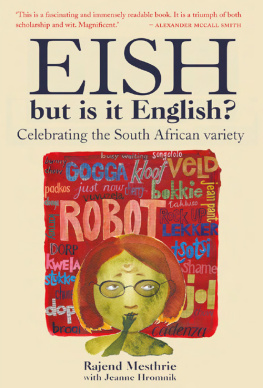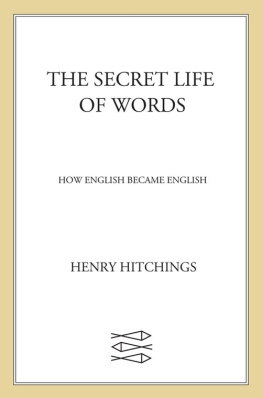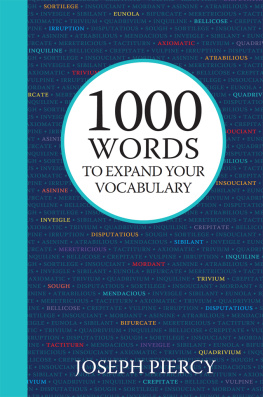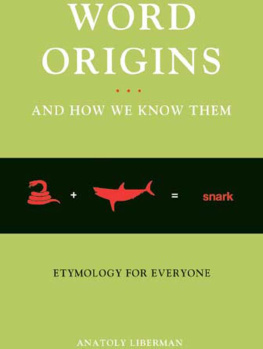Kick the Bucket
and
Swing the Cat
The Balderdash & Piffle Collection
of English Words, and
Their Curious Origins
Alex Games

This eBook is copyright material and must not be copied, reproduced, transferred, distributed, leased, licensed or publicly performed or used in any way except as specifically permitted in writing by the publishers, as allowed under the terms and conditions under which it was purchased or as strictly permitted by applicable copyright law. Any unauthorised distribution or use of this text may be a direct infringement of the authors and publishers rights and those responsible may be liable in law accordingly.
Version 1.0
Epub ISBN 9781446415115
www.randomhouse.co.uk

This book is published to accompany the television series Balderdash & Piffle , broadcast on BBC2 in 2006 (Series 1) and 2007 (Series 2). Series produced by Takeaway Media.
Executive Producer: Neil Cameron (Series 1), Archie Baron (Series 2)
Series Editor: Archie Baron (Series 1)
Series Producer: Caroline Ross Pirie (Series 2)
10 9 8 7 6 5 4 3 2
Published in 2008 by BBC Books, an imprint of Ebury Publishing.
A Random House Group Company.
Text Takeaway Media Ltd and Alex Games, 2006; Alex Games 2007
Alex Games and Takeaway Media Ltd have asserted their right to be identified as the author of this Work in accordance with the Copyright, Designs and Patents Act 1988.
All rights reserved. No part of this publication may be reproduced, stored in a retrieval system, or transmitted in any form or by any means, electronic, mechanical, photocopying, recording or otherwise, without the prior permission of the copyright owner.
The Random House Group Limited Reg. No. 954009
Addresses for companies within the Random House Group can be found at www.randomhouse.co.uk
A CIP catalogue record for this book is available from the British Library.
ISBN 978 1846076107
Commissioning editor: Martin Redfern
Project editors: Eleanor Maxfield & Nicholas Payne
Designer: seagulls.net
Production controller: Antony Heller
Contents
Note: Words and phrases discussed and/or defined in the text appear in bold type and are all listed in the index. Foreign words appear in italic type.
ALEX GAMES studied Classics at university and now teaches Latin. He has been a comedy critic, travel and feature writer for newspapers from the Financial Times to the Evening Standard, and has written comedy for BBC Radio One, Four and Sky TV.
Balderdash & Piffle , presented by Victoria Coren, was made by award-winning independent production company Takeaway Media

Foreword
by Victoria Coren
When I was a child, I made a list of my favourite words. Ferret. Tinsel. Quagmire. They were my top three.
I made the more traditional lists too: boys I liked, Barbie outfits, revenges to be exacted on horrible schoolteachers. But, while teachers and Barbies dominate our lives for a limited period of time, and boys become far less enigmatic with exposure, words remain mysteriously fascinating for ever. I still think I picked a good three. Ferret, tinsel, quagmire, all of them strange and perfect in their various ways. Ferret squirms slightly as you say it: a mischievous, wriggly little word. Tinsel is sharp and silvery against the teeth. You can get bogged down in quagmire, with its juicy start and claggy centre.
This is why there is no such thing as a perfect translation. The precise relationship between a word or phrase and its meaning is peculiar to every language.
You might say to a friend, Ill see you at teatime, meaning only an approximation of four oclock. But tucked away inside the word teatime, to a British ear, is a chill winter afternoon: darkness outside, a little orange glow around the streetlamps, and a pile of hot buttered crumpets on a table by the hearth. (And tucked away inside the word crumpets is a little parade of Victorian prostitutes, from the time when the word came to mean an attractive woman, for reasons which I cant possibly spell out here.)
Your plan, when you meet this friend at teatime, may involve neither chill winds nor tea, and I certainly hope it doesnt involve prostitutes. But every time you use an English word, it whispers a little story. Words are like the best sort of grandparents: still engaged and busy in the modern world, but full of colourful tales about the place they were born, the years of their youth, and the job they used to do. The question is, are we always listening? The reason I wanted to work on the series Balderdash & Piffle , when I usually consider myself far too fat and croaky to appear on television, is the opportunity it offered to investigate some of our more curious words and phrases at first hand. TV producers usually ring up and ask whether I might like to be a guest on their hilarious new panel game, pressing a buzzer and competing with stand-up comics to shout one-liners at a slightly frightened audience.
But this one said: Lets hire a Mini and travel to the birthplace of codswallop and ploughmans lunch. It was an irresistible adventure. Off we could go to ferret out the truth. World-class Scrabble players, I have read, are familiar with literally thousands of words without knowing their meaning. The letters are simply point-scoring symbols, and definitions dont matter. This is one of approximately fourteen reasons why I will never be a world-class Scrabble player. I cant imagine hearing a new word without wanting to know its meaning, and knowing its history is even better. We can understand our own history, as a nation, through these little tales.
When you know your etymology, the words ferret out should summon you immediately back to 1580, when gamekeepers sent half-tame ferrets down rabbit holes to flush out their tasty occupants. The word ferret itself, coming from the Old French fuiret and previously the Latin fur, furis (a thief), speaks to you of people moving across Europe in ancient times, bringing their languages with them and noticing, even then, that there is something suspicious and untrustworthy about ferrets. Look at zem, some Old French wordsmith must have muttered, Like leetle thieves. Except he probably thought it in French.
It must surely be worth knowing as much of this stuff as possible. Unlocking the history of words gives so much more weight, colour and poetry to every conversation we have. Why not let images of sixteenth-century gamekeepers dance in the mind, and sixteenth-century wives cooking delicious rabbit pies, rather than letting ferret out become a flat one-dimensional phrase with no further meaning than its figurative one? Why not keep those stories alive?
After the first series of Balderdash & Piffle (and thanks to the sterling work of amateur detectives all over the country, who helped us to investigate the history of words and phrases), forty-three changes were made to The Oxford English Dictionary ( OED ). Why are we so proud of that? Its partly because the English language is our greatest national treasure, and there is a pure satisfaction in recording it correctly. If you are the kind of person who enjoys the neatness of a finished crossword, the solving of a riddle, or the clear explanation at the end of a Sherlock Holmes mystery, you will know immediately why we yearn to make sure that the dictionarys entries and dates are completely accurate.







